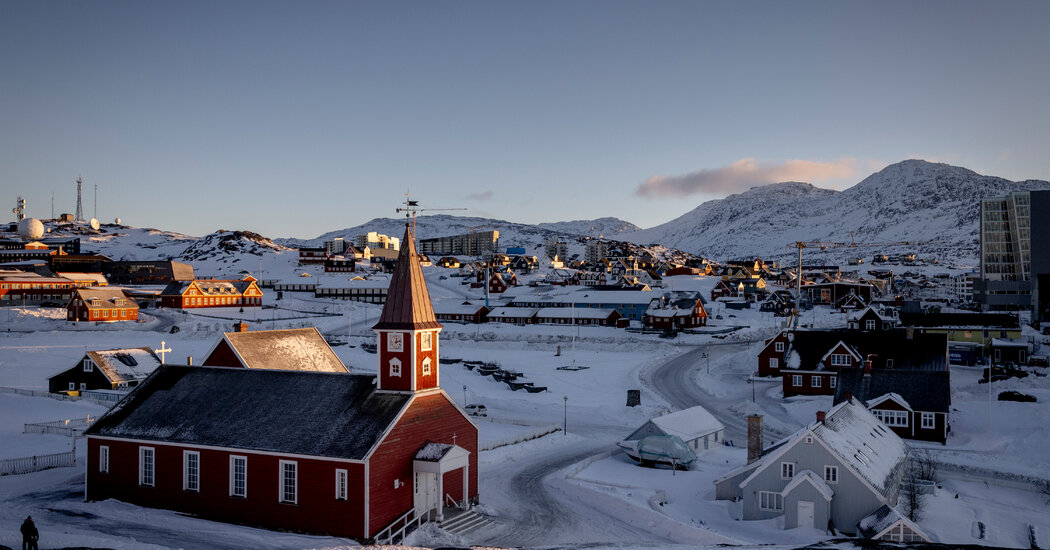Greenland’s Parliament banned foreign and anonymous political funding on Tuesday, in the semiautonomous island’s latest reaction to President Trump’s stated intentions to acquire it. Greenland’s lawmakers fast-tracked the law — an effort to protect against outside interference — before upcoming parliamentary elections.
The law is Greenland’s most aggressive effort yet to push back against Mr. Trump, who refused last month to rule out using military force to take the island. The law does not directly name him as a potential campaign contributor, but a proposal that laid out the law and its rationale made clear that his insistence inspired its authors.
“Given the geopolitical interest in Greenland and the current situation — where representatives of an allied great power have expressed interest in acquiring and controlling Greenland — the country is particularly vulnerable to attempts to influence its elections and political decision-making processes,” the proposal read.
The law was billed as an effort “to safeguard Greenland’s political integrity” in the proposal. Mute B. Egede, Greenland’s premier, proposed holding parliamentary elections on March 11.
Greenlanders were initially shocked and confused by Mr. Trump’s repeated desire that the United States take control of the territory. Donald Trump Jr., Mr. Trump’s son, briefly visited the island last month, which added to the speculation.
For the United States, Greenland sits in a strategic location: The island is home to a large American military base and, as climate change melts the Arctic ice, commercial and naval competition is growing in the far north. Greenland also has enormous reserves of rare elements and other minerals used to make advanced technology.
“We need it for national security,” the president has said.
Greenland has long been tied to Denmark, first as a colony and then as a semiautonomous territory. Since 2009, it has had the right to declare independence after a referendum, but it still relies on Denmark for its defense, security and other international affairs.
Greenland’s mostly Inuit population has increasingly chafed against Copenhagen’s oversight. Greenland’s leadership has flatly and repeatedly rejected Mr. Trump’s advances.
“Greenland is ours,” Mr. Egede said in a statement late last year, as Mr. Trump eyed the island. “We are not for sale and will never be for sale.”
Denmark, too, has been rattled: Last week, it said it would increase its military spending in the North Atlantic by $2 billion.
The Nordic country does not want to set off a trade war with the United States. After an icy phone call with Mr. Trump, Prime Minister Mette Frederiksen of Denmark traveled across Europe last week to meet with European and NATO leaders to increase support, do damage control and discuss how to respond to Mr. Trump’s intense demands.
“Trump will not have Greenland,” said Lars Lokke Rasmussen, Denmark’s foreign minister and its prime minister during Mr. Trump’s first term.
Greenland’s Parliament, the Inatsisartut, does not need Denmark’s approval to pass the law. Its lawmakers moved exceptionally quickly — the bill was only introduced on Saturday.
“Given the current geopolitical situation and the upcoming Inatsisartut election, the need for such regulation is considered urgent,” the proposal read.
Other countries, including the United States, restrict or ban foreign political funding. Greenland previously did not limit or prohibit such contributions, according to the proposal.
The proposal notes that foreign powers have tried to influence other democratic elections around the world in recent years. The authors specifically pointed to the enormous amount of private political donations in the United States.
“The initiative is obviously urgent,” said Ulrik Pram Gad, a researcher at the Danish Institute for International Studies.
He said donations had not previously influenced Greenland’s politics and called the law “primarily a preventive measure.”
Greenland is also trying to ward against foreign interests by limiting real estate purchases.
On Monday, lawmakers approved new regulations that would restrict land purchases to Danish citizens or people who have been permanent residents of Greenland for at least two years. The rules are expected to take effect later this year.
Greenland has about 56,000 residents and is mostly covered in ice. It is opening up to the world — it has said that it is ready for business and recently opened a new international airport — but its tourism infrastructure is sparse.
Foreign campaign contributions — even those seen as tiny by American standards — could drastically change Greenland’s political structure: Parties have been mostly financed by public subsidies, while private contributions have “constituted an insignificant part” of its political financing, the proposal read.
“The perspectives of this potential threat are alarming,” it read. “Donations that would be modest on an international scale would be colossal in a Greenlandic election campaign.”
Political parties will no longer be allowed to receive foreign or anonymous contributions. Neither will local and youth branches of parties, lawmakers, aides and candidates.
The new law will also cap the amount of private political donations. A political party can receive only about $28,000 in private donations a year. Individual donors can only give about $2,800. The law also strengthens and broadens disclosure requirements, among other considerations.
“Disproportionately large private donations could weaken public confidence in the integrity of political processes,” the proposal read.

